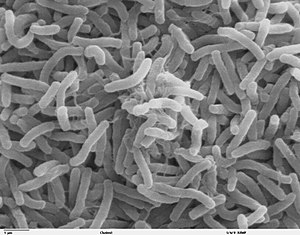
Cholera is a severe and often deadly water-borne disease.
If lemons or limes are available, it is recommended that adding a lemon for every liter of water reduces risk. Limes could be expected to have a similar effect, but use more due to their smaller size. Add it after other forms of treatment are complete.[verification needed] This reduces the pH of the water which is particularly suitable where cholera is a potential problem.[1]
Solar water disinfection is effective in reducing risk of water borne disease in children, including cholera. Water should be filtered as well as practically possible before solar disinfection. Point of consumption solar disinfection can be done with minimal resources and could be an important first line response to cholera outbreaks. Its effect on chorine resistant cholera is unclear, but it could be expected that it would still have similar sensitivity to UV light and heat.SODIS protects against cholera in children under 6 years of age, 2001]
See also[edit | edit source]
References[edit | edit source]
- ↑ "...cholera survives far, far better at high pH than at low pH. In fact, in a few outbreaks [of cholera] in the 90s, the Centers for Disease Control was advocating that people put a lemon per liter in their water. Lowers the pH down to around 4 point something.That's roughly as good as chlorine at killing off vibrios [i.e. cholera]. Incredibly effective." Les Roberts, lecture 5 or 6 (on Rwanda), Water and Sanitation Needs in Complex Humanitarian Emergencies, in the Global Health course of the Johns Hopkins Bloomberg School of Public Health, available as OpenCourseWare (OCW). (Quote occurs at 13 min 45 sec ion the MP3 file.)